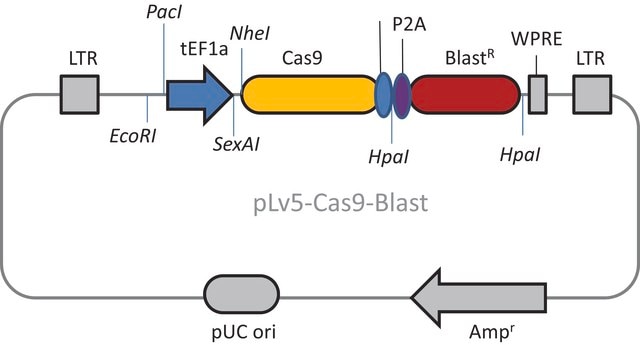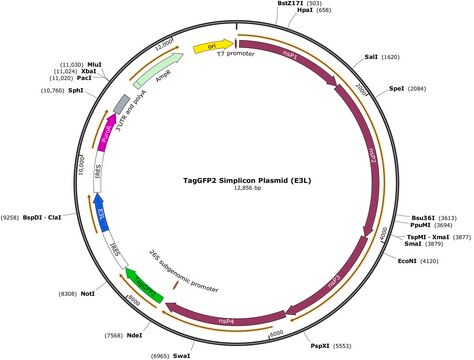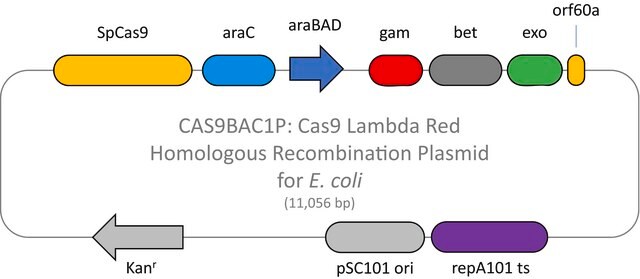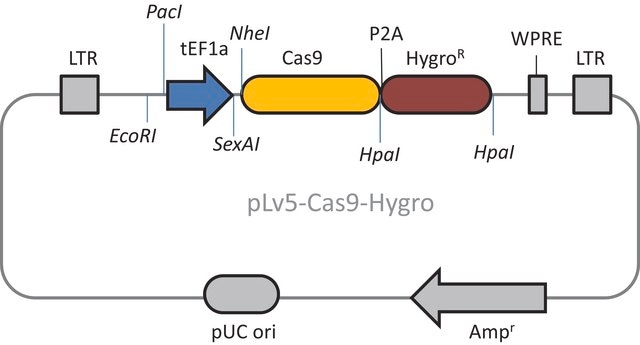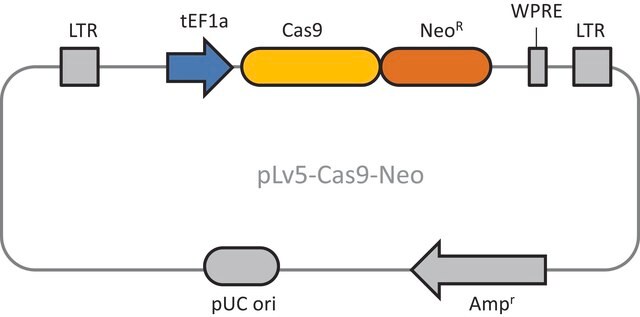Recommended Products
recombinant
expressed in E. coli
form
liquid
packaging
vial of 50 μL
concentration
20 ng/μL in TE buffer; DNA (1μg of plasmid DNA)
application(s)
CRISPR
Promoter
Promoter name: EF1-alpha
reporter gene
GFP
selection
ampicillin
shipped in
dry ice
storage temp.
−20°C
General description
This product is an expression plasmid that utilizes the EF1a promoter for strong transient expression of a Cas9-GFP-Geminin fusion (EF1a-Cas9-GFP-Geminin) allowing for easy visualization of successful transfection. The Cas9-Geminin expression plasmid is one part of a two part CRISPR system with individual Cas9-Geminin and gRNA expression vectors.
To order gRNA in any format click here
To order gRNA in any format click here
Application
Functional Genomics/Target Validation
- Performing HDR mediated targeted integration in multiple cell lines
- Creation of knock-in cell lines with promoters, fusion tags or reporters integrated into endogenous genes
Features and Benefits
- Highly specific and highly active
- Sequence verified
- Ready to use purified plasmid DNA
Principle
CRISPR/Cas systems are employed by bacteria and archaea as a defense against invading viruses and plasmids. Recently, the type II CRISPR/Cas system from the bacterium Streptococcus pyogenes has been engineered to function in eukaryotic systems using two molecular components: a single Cas9 protein and a non-coding guide RNA (gRNA). The Cas9 endonuclease can be programmed with a single gRNA, directing a DNA double-strand break (DSB) at a desired genomic location. Similar to DSBs induced by zinc finger nucleases (ZFNs), the cell then activates endogenous DNA repair processes, either non-homologous end joining (NHEJ) or homology-directed repair (HDR), to heal the targeted DSB. While HDR is absent in G1, NHEJ is active throughout the cell cycle and is largely favored over HDR. Consequently HDR can be increased by directly synchronizing the expression of Cas9 with cell-cycle progression by fusing Cas9 to human Geminin (a protein expressed in S and G2 phases). The Cas9-geminin fusion protein then regulates gene editing by promoting repair during S and G2 phases when homology directed repair (HDR) occurs. The result is creation of double strand breaks in cells at times that are more able to incorporate donor sequences.
Legal Information
Storage Class Code
12 - Non Combustible Liquids
WGK
WGK 2
Flash Point(F)
Not applicable
Flash Point(C)
Not applicable
Choose from one of the most recent versions:
Certificates of Analysis (COA)
Lot/Batch Number
Sorry, we don't have COAs for this product available online at this time.
If you need assistance, please contact Customer Support.
Already Own This Product?
Find documentation for the products that you have recently purchased in the Document Library.
Our team of scientists has experience in all areas of research including Life Science, Material Science, Chemical Synthesis, Chromatography, Analytical and many others.
Contact Technical Service



